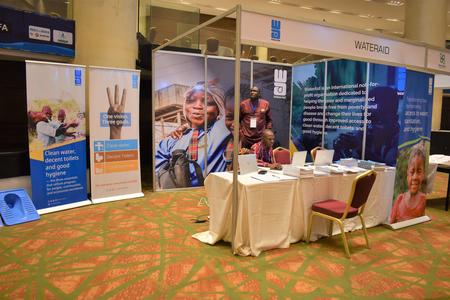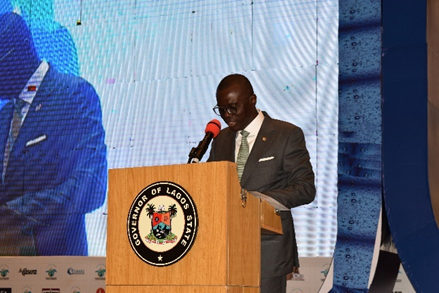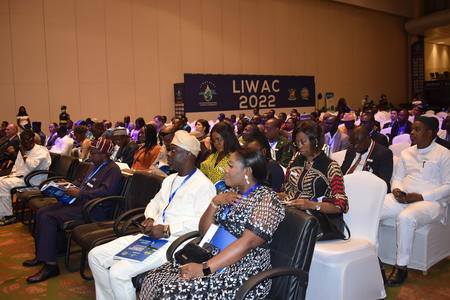Policy key to attracting investments into WASH Sector in Lagos State – WaterAid, other experts

30 June 2022, Nigeria – International not-for-profit, WaterAid has underscored the importance of having a strong water, sanitation and hygiene (WASH) policy, as a critical strategy in driving investments into the WASH sector in Lagos State.
Speaking at the 2022 edition of the Lagos International Water Conference (LIWAC), WaterAid Nigeria Country Director, Evelyn Mere, stated that a WASH policy will improve investors’ confidence and draw meaningful investment into WASH in Lagos State, especially from the private sector. Ms Mere added that WaterAid is currently supporting the review of the WASH Policy in Lagos State and has engaged with Lagos State through the Water Regulatory Commission, over the past two years, providing support for LIWAC, as part of its commitments aimed at achieving sustainable access to WASH services in the state.
LIWAC is organised annually by the Lagos State Water Regulatory Commission (LASWARCO), with the support of WaterAid and other development and private sector partners, to unlock great opportunities for private sector investment to promote access, efficiency, sustainability in water, sanitation and hygiene services.
Executive Secretary of LASWARCO, Funke Adepoju, said:
“Lagos is a significant megacity, with over 24 million people, a projected annual growth rate of 3.2%, and according to the Nigeria Investment Promotion Commission, the seventh fastest-growing city globally, with the highest GDP and internally generated revenue in Nigeria. The agenda for a greater Lagos cannot be complete without igniting the water economy.”
Giving the opening remarks at the 3rd edition of the international water conference, whose theme is ‘Unlocking Investments and Sustainable Access to Clean Water and Sanitation Services: The Regulatory Imperative’, the Lagos State Commissioner for Environment and Water Resources, Mr Tunji Bello, said “Resolution of the multifarious challenges confronting the water and wastewater management sector in Lagos requires a dedicated and thoughtful approach in delivering the ideals of SDG6 to the citizenry.”
Also speaking at the event featuring renowned experts in the WASH sector from Nigeria and across the globe, Engr Benson Ajisegiri, Veteran WASH Sector Reform Specialist, spoke on the WASH crisis in Nigeria, saying most states and agencies are operating with extremely low capacity. On the side-lines of the event, he expressed that Lagos has a huge market for water supply, however investors need to feel protected by an effective policy, because policy demonstrates intentionality on the part of the government.
Special guest, Dr Rob Fuller, the Global Water Sector Advisor, WaterAid UK, stated that professionalization of the WASH service delivery sector, especially in urban contexts and megacities like Lagos, is critical to the mission to achieve equitable access to safe water and sanitation. Fuller expressed that utilities and service providers must prioritize performance improvement and gain credibility whereby investors, including public, private and donors, have faith that their investments will yield returns.
On Day 2 of the event, LASWARCO with support from WaterAid Nigeria and Arctic Infrastructure are hosting an investment café which presents an opportunity to bring the needs of the WASH sector in Lagos to non-state actors and the private sector for innovative financing and investment opportunities.
Gracing the conference on day two, Executive Governor of Lagos, Babajide Sanwo-Olu acknowledged that financing for the water sector has been a challenge for the state. He said:
“According to a 2015 World Bank Survey, bridging the financing gap of Lagos’ WASH sector will require an estimated $1.3billion investment per year, over the next ten years. Most of the financing for water and sanitation comes from public budget and donor financing, hence this call of action for the private sector to explore the myriad of opportunities in the water sector and sanitation services sub-sector to deliver the value that is required to make the needed commercial gain.
“Investment in water is a pro-poor intervention and it is the way to go. Government needs to do its own part, but we all have to meet ourselves midway to make it sustainable.”
Evelyn Mere, Country Director of WaterAid Nigeria, said:
“Policy is key to attracting meaningful investment into the sector, especially from the private sector. Investors expect certainty, security and clarity of roles and responsibilities and stability of institutions that will guarantee stable operations and return on investment. The sector is capital intensive and requires huge funding to operate optimally. Only a policy backed up by clear legislation that protects all players will evoke the confidence necessary for investment to flow into the sector.”
/ENDS
For more information, please contact:
Oluseyi Abdulmalik, Communications & Media Manager,
[email protected], +234 8034312391
Notes to Editors:
WaterAid
WaterAid is working to make clean water, decent toilets and good hygiene normal for everyone, everywhere within a generation. The international not-for-profit organisation works in 28 countries to change the lives of the poorest and most marginalised people. Since 1981, WaterAid has reached 27 million people with clean water and 27 million people with decent toilets. For more information, visit www.wateraid.org, www.wateraid.org/nigeria; follow @WaterAidNigeria, @WaterAid or @WaterAidPress on Twitter, or visit us on Facebook at www.facebook.com/wateraid, www.facebook.com/wateraidnigeria
* In Nigeria:
- Only 10% of the population has access to basic water, sanitation, and hygiene services.
- 68 million people (33% of the population) lack access to basic drinking water services.
- 113 million people (55% of the population) lack decent toilets.
- 48 million people (23% of the population) practice open defecation.
- 171 million people (83% of the population) lack basic handwashing facilities.
- Only 11% of schools have access to basic water, sanitation, and hygiene services.
- Only 6% of healthcare facilities have access to basic water, sanitation, and hygiene services.
- Only 4% of parks and markets have access to basic water, sanitation, and hygiene services.
* 2021 WASH National Outcome Routine Mapping (WASH NORM)





